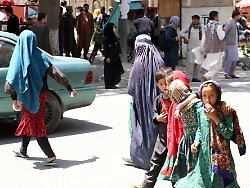Monday, August 16, 2021
“I have to destroy everything”
The day the Taliban took Kabul
One provincial capital after another – the Taliban are conquering Afghanistan at a rapid pace. Suddenly the Islamists are standing at the gates of Kabul. While the German Armed Forces are announcing the largest evacuation of all time, Afghans in Kabul experience a day like being on a roller coaster.
Niksad Salahuddin comes home drenched in sweat and in panic opens all the drawers on his desk. He has just walked for two hours in the blazing sun down the dusty street from his office in the center to his house in the far north of the Afghan capital Kabul. “Where are the scissors?” He asked his wife. And then he started clearing out his black document folder, says the 35-year-old on the phone. “I’m scared as hell,” he says and has to take a breath. “Everyone says the Taliban are already in town.”
He started to cut shredded ID cards, letters of recommendation and visa documents into small pieces. Some of them were from the US armed forces and the Afghan Ministry of the Interior. Documents, he believes, that could cost his head if the Taliban found them. “I have to destroy everything,” he mumbles before hanging up.
Early on Sunday morning, the Taliban took over the penultimate city in the country, Jalalabad in the east. Less than two hours later, the capital Kabul was suddenly upside down. “Nobody knew where the news came from, but suddenly it was said that the Taliban are already in Dascht-e Bartschi in the west of the city,” says Humajun Sabs, a resident of Kart-e Tschar, the city’s liberal district.
“Everyone went in all directions”
Then I abandoned all common sense among the people. Hundreds flocked to banks and tried to withdraw their savings. There were fights and shootings for order in line. Others began using their fingernails to scratch off the windows of their cars with a likeness of Ahmad Shah Massoud, the legendary deceased fighter against the Taliban from the Punjir Valley. Elsewhere, painters were quickly summoned to quickly paint over all too revealing advertisements in shops showing women. Musicians also had their banners removed. As soon as shots were fired anywhere – and it is not uncommon for someone to fire into the air for no reason in Kabul – people began to run in all directions. Some apparently only ran away from men in black turbans. These are often worn by the Taliban. The helicopters, which thundered extremely close to the roofs in the center of the city every few minutes, probably flew out foreigners and vibrated the panes of glass, did not help to calm the situation.
At some point nothing went on the streets of the city, says Sabs. Newly arrived refugees from the districts around Kabul, people who all hurried home, and convoys of security forces who had withdrawn from other provinces around the city mingled on them. “Everyone drove in all directions, on sidewalks and whatever other obstacles, to get home.”
The peaceful transfer of power
The panic of Salahuddin and millions of other people in Kabul, which stems from memories of the earlier years of brutal Taliban rule between 1996 and 2001, ultimately turned out to be unfounded for the time being. The Islamists ordered their fighters not to advance into the city, but to take a position on the outskirts. The Afghan interior and defense ministers also finally broadcast videos in which they declared that there would be a peaceful change of power. They called on people not to fall victim to propaganda. They probably wanted to prevent looting.
Just a few hours later in the afternoon, Kabul suddenly looked like a ghost town. “Not a single person is on the street,” said Farsad Husseini, who lives in the center of the city. All shops are closed, all markets, there is not a greengrocer with his wooden cart on the side of the road. Everyone had barricaded themselves at home with great worries and would wait and see what happens next. Until then, neither the Taliban nor the government had made a clear announcement.
Anger and despair
Many citizens used the time to express their anger over the events of the past few weeks on social media. They cursed the security forces, who had hardly offered any resistance to the Taliban. They scolded the Taliban for having started this offensive in the first place. They scolded the Americans for failing them. And they cursed President Ashraf Ghani, who was to blame for the whole mess.
It is early evening when Salahuddin can lean back for the first time. “I’m a little better now,” he says, on the phone again. The documents that incriminate him the most have been destroyed. “My wife burned everything and we took the ashes away.” However, the longer the evening lasts, the more worried it becomes. He sees a message on his cell phone that the president has left the country and the Taliban ordered their fighters to enter the city and occupy vacant ministries and security posts – which they did slowly. He saw videos from the airport showing people arguing and evacuation flights. “Who would have thought,” he concludes, “that they could take the whole country in ten days.”
.
